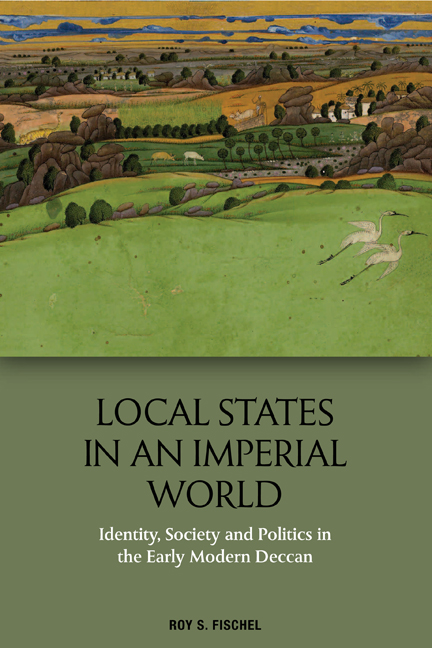Book contents
- Frontmatter
- Contents
- List of Illustrations and Tables
- Note on Transliteration
- Acknowledgements
- Introduction
- 1 Mapping the Deccan
- 2 The Sultanates and the Deccan
- 3 Foreigners, Locals and the World
- 4 Locality, Vernacular and Political Language
- 5 Limitations of the Deccani System
- 6 Conclusion: Hoopoes and Falcons
- Bibliography
- Index
5 - Limitations of the Deccani System
Published online by Cambridge University Press: 26 September 2020
- Frontmatter
- Contents
- List of Illustrations and Tables
- Note on Transliteration
- Acknowledgements
- Introduction
- 1 Mapping the Deccan
- 2 The Sultanates and the Deccan
- 3 Foreigners, Locals and the World
- 4 Locality, Vernacular and Political Language
- 5 Limitations of the Deccani System
- 6 Conclusion: Hoopoes and Falcons
- Bibliography
- Index
Summary
The engagement of the Deccan sultanates with the locality, be it as part of a state-acknowledged vernacularisation process or in the shape of non-particular localisation, achieved considerable success. The sultan-ates were able to gain the support of substantial elite groups, Muslim and non-Muslim alike, with whose backing they secured their rule for many years. Particularly in their core regions on the Deccan Plateau, the rule of the Qutb Shahi and ᑦAdil Shahi sultans remained unchallenged until the mid-seventeenth century. Even in shaky Ahmadnagar, where the Nizam Shahi rulers faced continuous internal instability and Mughal aggression, the dynasty maintained its monopolistic position of legitimacy.
The success of the sultanates, however, had evident limitations. In certain places, substantial gaps separated the sultans, the ideology they projected, and their ability to enforce it, on the one hand, and the willingness of local elites to accept their message, on the other hand. Regions not under firm sultanate rule, beyond the core region of a sultanate or under weakening authority, were particularly problematic. From the second quarter of the seventeenth century, more general upheaval put the system to the test. The events started with a historical coincidence. In 1626–7, a whole generation of rulers died. Sultan Muhammad Qutb Shah of Golkonda was succeeded by his son, ᑦAbdullah (r. 1626–72). Malik Ambar died the same year, throwing Nizam Shahi domains back into confusion. In 1627, Ibrahim ʿAdil Shah II of Bijapur was succeeded by his son Muhammad (r. 1627–56). No less important was the death of the Mughal Emperor Jahangir in late 1627, to be succeeded by his son Shah Jahan (r. 1628–58). The combination of sweeping changes in leadership in the Deccan and the expansionist ambitions of the new Mughal emperor was bound to have a major effect on the region. The decade that followed was tense, not the least due to the Mughal invasion. A peace treaty in 1636 seemingly secured the northern border of the sultanates, allowing them to expand considerably. This expansion, however, brought the internal tensions and questions of control back to the surface, shaking the ruling dynasties. With renewed Mughal aggression in the mid-1650s the situation seemed ever grimmer; the sultanates only barely survived the war.
- Type
- Chapter
- Information
- Local States in an Imperial WorldIdentity, Society and Politics in the Early Modern Deccan, pp. 192 - 235Publisher: Edinburgh University PressPrint publication year: 2020



